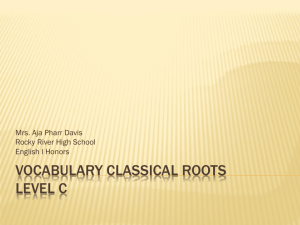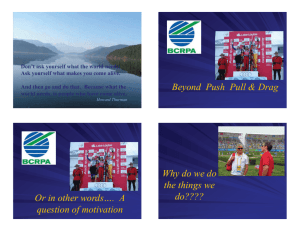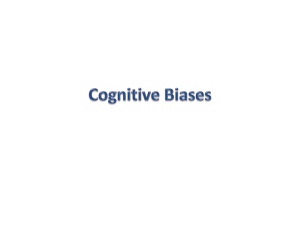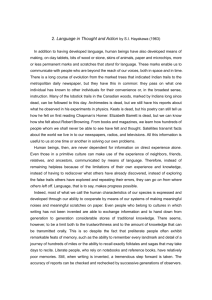• Charles Darwin: The Evolution of Species Auguste Comte: Human Progress
advertisement
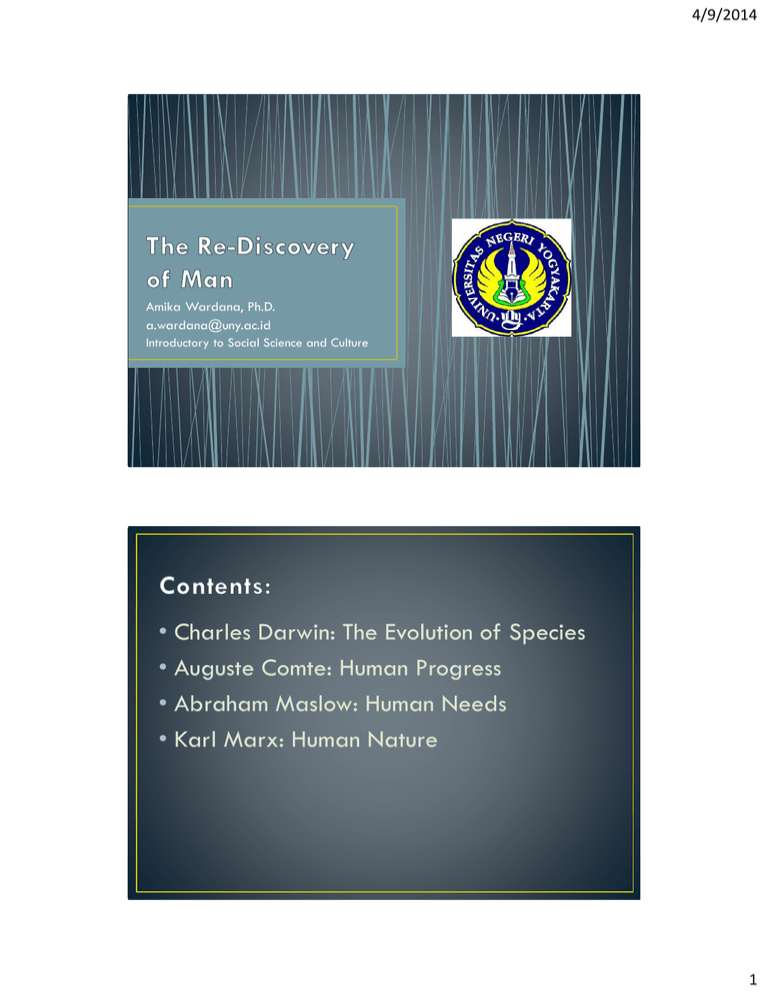
4/9/2014 Amika Wardana, Ph.D. a.wardana@uny.ac.id Introductory to Social Science and Culture • Charles Darwin: The Evolution of Species • Auguste Comte: Human Progress • Abraham Maslow: Human Needs • Karl Marx: Human Nature 1 4/9/2014 • The Origins of the Species by Means of Natural Selection, or the Preservation of Favoured Races in the Struggle of Life • Human Biological Evolution? Did Ape Precede Human Being? • Impact: • The Scientific Study of Biological Organism • The Scientific Study of Human Being • The Law of Three Stages of Human (Societal) Development • The Theological stage refers to explanation by personified deities that that all the phenomena of nature are the creation of the divine or supernatural. Men and children failed to discover the natural causes of various phenomena and hence attributed them to supernatural or divine power: 1) fetishism; 2) Polytheism; and 3) Monotheism 2 4/9/2014 • The Metaphysical stage, the extension of the theological stage, refers to explanation by impersonal abstract explanation that in this context, God is an abstract being yet having abilities to engender power or force guides and determines events in the world. Metaphysical thinking discards belief in a concrete God. The nature of inquiry was legal and rational in nature. • The Positive stage, also known as the scientific stage, refers to scientific explanation based on observation, experiment, and comparison, relying upon a distinct method, the scientific method, for their justification, in order to establish cause and effect relationships. Positivism is a purely intellectual way of looking at the world; as well, it emphasizes observation and classification of data and facts, including finding the ways to rule the world. 3 4/9/2014 • The Hierarchy of Human Needs • Biological and Physiological needs. A human being can not function well without water for example, so these needs are critical for human survival • Safety Needs. Once people don’t have to worry about their basic survival needs they yearn and focus more on protection from injustice as well as their financial needs. They seek fairness and order in the world. When they feel free from danger, (and can be comfortable) they are able to learn more about their environment and reach out to others. 4 4/9/2014 • Belongingness and Love Needs. When people are about to feel comfortable about connecting with others, they feel that they have a group to belong too. They also feel that they can reach out to the experts in their lives/community to promote learning. In this stage groups, clubs, social work exam study groups, and activities are important. People can meet others that have the same types of interests as they do. Feeling connected and loved by a community helps build a healthy self esteem as well as self-appreciation. • Self-Esteem Needs. Once a person has found their place in groups they discover activities that they love to do. By doing this they are able build up their self esteem. People will seek satisfaction through their achievements and will work towards their desired reputation. At work they will seek responsibility and try to work up the ladder of success. 5 4/9/2014 • Self-Actualization. Being a Humanist, Maslow believes that humans strive to reach their fullest potential. People who look for wisdom and personal growth have mastered the other stages of this hierarchy, and are fully functional. • “Human beings make history, but not in circumstances of their own choosing”. • Human beings are an ensemble of social relations, which are intertwined with the social relations and institutional contexts they have growth up. • Human beings are not a static thing but varies historically and socially (or politically). In other words, human beings are, in some respects, shaped dialectically by the contradiction of the society. 6 4/9/2014 • Important point: not about the human nature itself, yet the ways human beings are “modified” in each socio-historical and political epoch. • So, there are no natural tendencies of human to violence; smart; wise; etc. • First: Labour creates something in reality that previously existed only in imagination, for specific purposes. The process include the creation of external objects out of human thought namely objectification. • Second: Labour is material that is created in order to satisfy humans’ needs. • Third: Labour does not merely transform nature; it also transforms humans including their needs, consciousness and their human nature. 7 4/9/2014 1. The objectification of humans’ purpose; 2. The establishment of an essential relation between human need and the material objects of their needs; 3. The transformation of human nature • The rise of Capitalism transforms the ways human nature and labour work out • Alienation arises when labour of human beings is not addressed to satisfy their own need; but merely exploited to serve the needs of others • Alienation makes human beings lost of what they ought to be. 8

